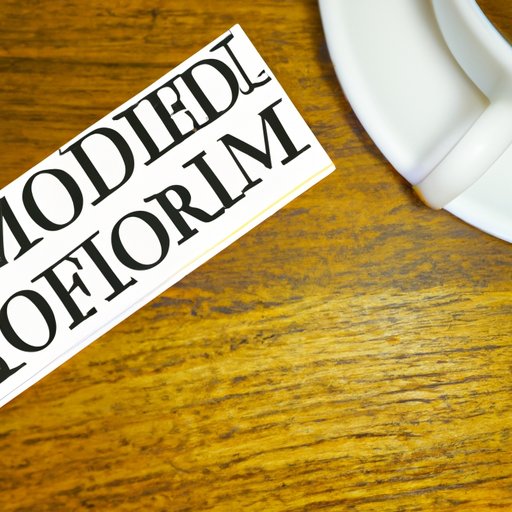Introduction
Coffee is a ubiquitous beverage enjoyed by millions of people worldwide. However, for members of the Church of Jesus Christ of Latter-Day Saints (LDS), also known as Mormons, drinking coffee is prohibited. This article aims to explore the reasons behind this restriction, including religious beliefs, health considerations, historical context, personal experiences, and psychological implications. Whether you’re a devout Mormon or simply curious about their practices, this article will provide you with valuable insights into a topic that is often misunderstood.
Religious Beliefs and Doctrines
The LDS Church was founded in the early 19th century and has since become one of the fastest-growing and influential religions in the world. At the center of their beliefs is the Book of Mormon, which they consider to be another testament of Jesus Christ alongside the Bible. One of the fundamental teachings of the LDS is the Word of Wisdom, a revelation given to the church’s founder, Joseph Smith, in 1833.
The Word of Wisdom is a code of health and dietary guidelines that includes prohibitions on alcohol, tobacco, and caffeine, as well as recommendations on healthy eating and exercise. The LDS Church considers adherence to the Word of Wisdom to be a commandment from God, rather than merely a suggestion or recommendation. Therefore, members of the LDS Church are expected to follow these guidelines as a demonstration of their obedience and faith.
So, why is coffee prohibited under the Word of Wisdom? The official LDS interpretation is that coffee contains harmful substances that can have negative effects on the body and mind. These include caffeine, which is a stimulant that can cause addiction and lead to insomnia, anxiety, and other health problems.
Health Benefits and Risks
While there are certainly risks associated with excessive coffee consumption, there are also potential health benefits that cannot be ignored. For example, studies have shown that moderate coffee consumption can increase alertness, improve mood, and reduce the risk of diseases such as type 2 diabetes, Parkinson’s, and some types of cancer.
However, the LDS Church encourages its members to prioritize their health and well-being by avoiding substances that can harm the body or lead to addiction. This aligns with their broader teachings on self-care and wellness, which emphasize the importance of maintaining physical, emotional, and spiritual health through a balanced lifestyle.
Historical Context and Religious Traditions
The Word of Wisdom has evolved over time and has been subject to various interpretations and modifications. For example, while the original revelation did not explicitly prohibit caffeine, subsequent teachings and church leaders’ guidance have clarified that coffee, tea, and other caffeinated beverages are not in line with the Word of Wisdom.
Other dietary restrictions in the LDS Church include avoiding meat on certain days of the week and fasting once a month. These practices are seen as a way to strengthen one’s faith, increase spiritual awareness, and improve physical and mental health.
Personal Stories and Experiences
Many members of the LDS Church have struggled to give up coffee, especially those who were regular consumers before joining the church. However, the benefits of obedience to the Word of Wisdom, including physical, emotional, and spiritual healing and empowerment, have motivated many to overcome their cravings and addictions.
Individuals and families in the LDS community approach the coffee restriction in different ways, depending on their personal circumstances and beliefs. Some view it as a small sacrifice compared to the blessings they receive from following the Word of Wisdom, while others may find it challenging to navigate social situations where coffee is a prevalent beverage.
Psychological and Social Implications
The prohibition on coffee can have significant psychological and social implications for members of the LDS Church, especially those who live in cultures where coffee is a central part of daily life. It can be challenging to feel included in social situations where coffee is celebrated, and many people may feel pressure to conform and indulge in the drink.
However, there are alternative drinks and social activities that can help Mormons still feel connected and engaged without compromising their beliefs. Some examples include herbal tea, hot chocolate, or even specialty coffee drinks without caffeine, such as decaf. It’s also essential for the LDS Church to continue to offer support and guidance for members who may be struggling with this restriction.
Conclusion
In conclusion, the prohibition on coffee for Mormons is rooted in their religious beliefs, health considerations, and historical traditions. While the risks and benefits of coffee consumption may vary, members of the LDS Church are expected to prioritize their health and well-being by avoiding substances that can harm the body or lead to addiction. While this can be challenging in a culture that celebrates coffee, there are alternative drinks and social activities that can help Mormons feel connected and engaged without compromising their beliefs.
Whether you’re a member of the LDS Church or simply curious about their practices, it’s essential to approach this topic with sensitivity and respect. Ultimately, the motivation behind the coffee prohibition and other dietary restrictions in the LDS Church is to promote health, wellness, and spiritual growth.
